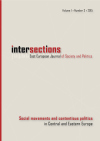Social Movement Studies for East Central Europe?
Social Movement Studies for East Central Europe?
The Challenge of a Time-Space Bias on Postwar Western Societies
Author(s): Ágnes GagyiSubject(s): Social Sciences, History and theory of sociology
Published by: MTA Társadalomtudományi Kutatóközpont Kisebbsegkutató Intézet
Keywords: Social movements; Social movement studies; East Central Europe; Global; New middle class movements
Summary/Abstract: The paper claims that through its genealogy, Social Movement Studies (SMS) as a discipline incorporated a time-space bias on postwar Western affluent societies which defined the way it conceived of movements and their socio-institutional contexts. Two interrelated effects of that bias were the assumption that material claims belong to the past, and a focus on short-term contextual factors in movement dynamics. As a new wave of movements after 2008 raise material claims in Western contexts again, earlier frameworks of SMS are being transformed so as to capture the relationship of movements to long-term structural processes. However, a newly forming consensus that links new movements to the “crisis of democratic capitalism” seems to maintain the bias on Western experience. East Central European (ECE) countries, where austerity and democratization came hand in hand after 1990, hardly fit that picture. The paper asks whether new transformations within SMS, and an increased attention toward ECE movements due to their new proliferation provides a possibility for comparative perspectives beyond the time-space bias. It identifies a tendency in SMS of post-socialism to translate the time-space bias of SMS frameworks into a normative framework of development toward Western models (or lack thereof), which worked to obscure the long-term history of movements in ECE, as well as forms of popular politics and state-society relations different from Western models. The paper proposes a world-systems approach to the task of comparative understanding of movements in different contexts, and illustrates its possible gains through the conceptualization of new middle class movements in ECE.
Journal: Intersections. East European Journal of Society and Politics
- Issue Year: 1/2015
- Issue No: 3
- Page Range: 16-36
- Page Count: 21
- Language: English

